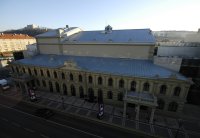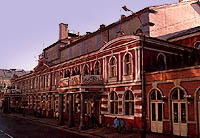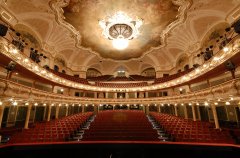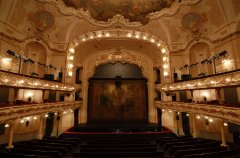Karlin Musical Theatre

Present condition
One of the oldest and most beautiful theatres in Prague, founded by the capital city of Prague. Before its reconstruction it was also the theatre with the largest capacity - 1244 seats. Because a good view was not possible from all the seats, after reconstruction there are 'only' 921 seats in the theatre. Thanks to an increase in the elevation of the auditorium, the view of the stage from all seats is perfect. After a complete and extensive reconstruction, financed by the capital city of Prague at the cost of 630 million crowns, a fantastic new theatre has been born: Karlin Musical Theatre - after the State Opera the second largest theatre in Prague.
This Nouveau Baroque building was constructed in 1881, had benches inside, was initially used as a circus, and was later adapted as a place for variety shows. After World War I, Karel Hašler extended the repertoire with cabaret, and in the 1920's different theater groups including Bratislava's National theater staged guest performances in this building. At the beginning of the thirties the Modern Opera was based here, although soon after the variety show was reinstated. It wasn't until the year 1932 that the original benches were removed and replaced by classical seats. During the German occupation, a group from the temporarily closed National Theatre (under the name Theatre For Now) acted here, and in 1944 the radio drama of Vinohrady Theatre was performed here as well.

před rekonstrukcí
In 1945, E. F. Burian commenced the regular operation of a repertoire of musical theatre with the operetta King of Vagabonds in Karlin's building. During this time, the names of the theatre changed frequently: Theatre in Karlin, Operetta in Karlin, Comic Opera. After 1948, when it was owned by Czechoslovak's State Film with the name Theatre of Folk Art, Jan Werich and Oldřich Nový were put in charge of its leadership. Werich brought here an American musical Finian's Rainbow from the Theatre of V+W (Voskovec+Werich), where they introduced it with Voskovec for the first time in Europe. From 1950, the theatre belonged to the city of Prague and in 1954 it became a possession of the state under the name: State Theatre in Karlin. In 1961 the theatre was reinstated by Prague's municipal council as Karlin Musical Theatre and it has remained with this name and status till now.
In 1963 the Music Theatre in Nusle was incorporated with Karlin Theatre; its operation finished in 1978. In 1981 the Theatre Semafor came under Karlin Theatre's administration. It remained in the basement of the building until the end of 1990, and in 1992 it was reconstructed into the small stage Little Karlin (between 1995-2002 Semafor was settled there again). The operation of Karlin Musical Theatre and Little Karlin (Semafor) was stopped when it was destroyed by a devastating flood in 2002.
At the beginning of the fifties, a series of noted men of the theatre worked in Karlin Musical Theatre: director Jiří Frejka, Jan Werich as an artistic chief, Oldřich Nový, Alfréd Radok directed here, Vítězslav Nezval cooperated here. The series of known artists appearing in Karlin's theatre at that time: Ljuba Hermanová, Jaroslava Adamová, Soňa Červená, Jiřina Steimarová, Rudolf Cortés, Vlasta Burian, Jára Pospíšil, Vladimír Ráž etc. In 1962 Karel Vlach came back indefinitely to Karlin Theatre with his swing bigband (he'd been here previously from 1948-53).


The repertoire was enriched by musicals in the sixties - My Fair Lady, Can-Can, Hello, Dolly!, Kiss Me Kate, The Man of La Mancha, West Side Story and also original productions - Schneider's and Ondráček´s Gentlemen, Horníček´s 'Tvrďák' and others. The operetta Rose Marie was a success in 1964, and its composer Rudolf Friml also appeared in the production. He visited the Karlin Musical Theatre several more times. Smaller Czech comedies were introduced in Nusle – for example Father, Mother, John and Kate. Toward the end of the seventies, the plays of Jiří Voskovec and Jan Werich with music of Jaroslav Ježek were featured (for example, The Golem) and the repertoire included other popular international musical hits – for example, Cabaret. In the eighties the successful Czech music comedy 'Zvonokosy' (after G. Chevallier), the musicals Some Like It Hot and Gypsies Go To Heaven were staged.
The nineties marked a comeback of operetta - Gypsy Baron, The Gypsy Princess , Polish Blood, The Merry Widow, Return of the Vampire, Countess Marica, The Land of Smiles, but also a return to classical musicals - My Fair Lady, Hello, Dolly!, Some Like It Hot, and Zorba the Greek.
Personalities in the history of our theatre
Directors: Jiří Frejka, Oldřich Nový, František Paul, Karel Jernek, Rudolf Vedral, Otto Haas, Petr Novotný, Petr Kracík, Antonín Procházka.
Conductors: Karel Vlach, Rudolf Kvasnica, Dalibor Brázda, Miroslav Homolka, Milivoj Uzelac, Arnošt Moulík, Ota Balage, Kryštof Marek.
Choreographers: Boris Milec, Manon Chaufour, Bedřich Füsseger, Josef Koníček, Luboš Ogoun, Zdeněk Prokeš, Jan Hartmann, Helena Brousková, Pavel Strouhal.
Stars (celebrities): Nelly Gaierová, Miloš Zavřel, Dagmar Rosíková, Věra Macků, Ivo Gübel, Věra Kalivodová, Věra Vlková, Milena Zahrynowská, Laďka Kozderková, Karel Fiala, Ladislav Županič, Karel Gult, René Gabzdyl, Pavla Břínková, Galla Macků, Vratislav Kadlec, Zdeněk Matouš, Jan Ježek, Jitka Molavcová, Lubomír Lipský, Vladimír Brabec, Petr Štěpánek, Radoslav Brzobohatý, Yvetta Blanarovičová, Kateřina Brožová, Tereza Duchková, Lumír Olšovský, Michaela Dolinová, Daniel Rous, Iveta Dufková, Václav Vostarek, Pavlína Millerová, and many others.
Thálie Awards: 1995 Yvetta Blanarovičová for the role of Eliza in My Fair Lady, 1996 Jitka Molavcová for the role of Dolly Leviová in Hello, Dolly!, 1997 Lubomír Lipský for the role of comedian Billy Kipp in Dreams of New York, 1998 Ladislav Županič for the role of Albín in The Cage of Fools, 2000 Tomáš Černý for the Prince Su-Čong in The Land of Smiles, 2001 Lumír Olšovský for the role of Cosmo Brown in Singing in the Rain. For her life-mastership in the field of operetta, Nelly Gaierová was honoured with a Thalie Award 93, a longstanding member of Karlin Musical Theatre.
After the Velvet Revolution in 1989, the town-council selected Zdeněk Pospíšil as the director of the theatre, who was replaced by Ladislav Županič in 1993.
Since 2003 the director of the theatre has been Egon Kulhánek, a producer of the most successful Czech musical Dracula, which saw over 1,250,000 viewers. The art director is Pavel Polák, the first Czech Mario from the legendary Les Misérables, and the technical manager is Jiří Blažek. The dramaturgist is the translator, lyricist, and former musical producer, Adam Novák.
New premieres: the classic musical West Side Story, Svoboda´s and Podskalský´s Night on Karlstejn, the Broadway musical Jekyll & Hyde (whose Czech premiere was visited by the authors Frank Wildhorn and Leslie Bricusse). The production of Strauss´s Return of the Vampire was restaged in a Czech version. The latest premieres in the historical building after the reconstruction: the Broadway hit The Producers, the Czech classic Lemonade Joe and a piece by the celebrated Emmerich Kálmán - The Gypsy Princess. New leadership invited new cooperators: for example, soloists Monika Absololonová, Kateřina Brožová, Daniel Hůlka, Marián Vojtek, David Uličník, Aleš Briscein, Roman Vojtek, choreographers Richard Hes and Pavel Strouhal, designers Daniel Dvořák, Lucie Loosová, Martin Černý and Kateřina Štefková, the American conductor Alexander Frey and many others.
